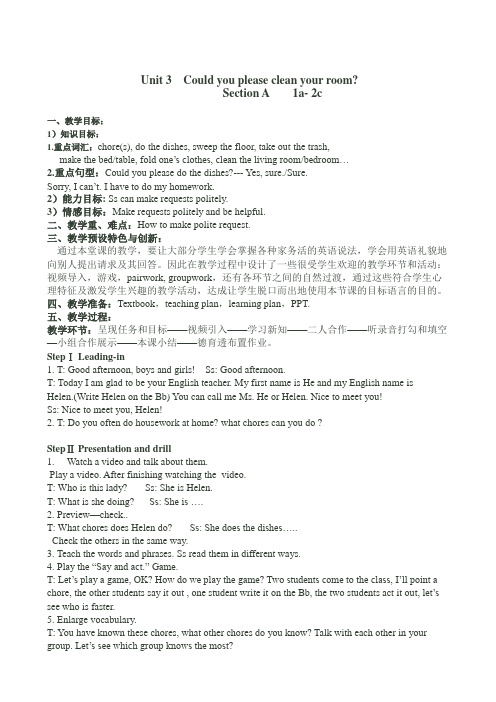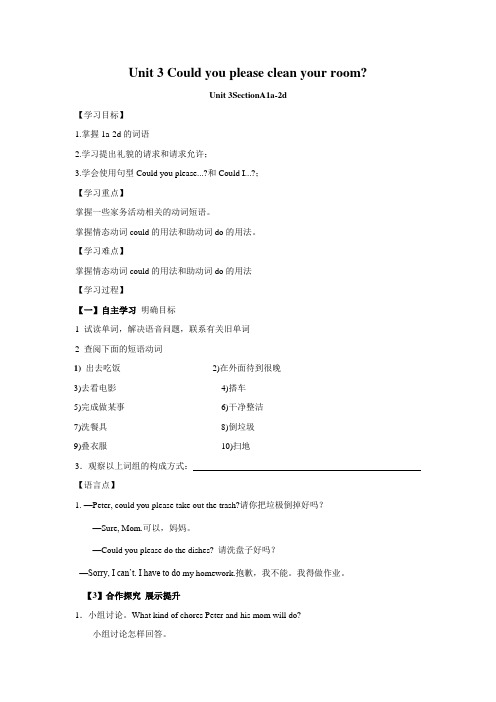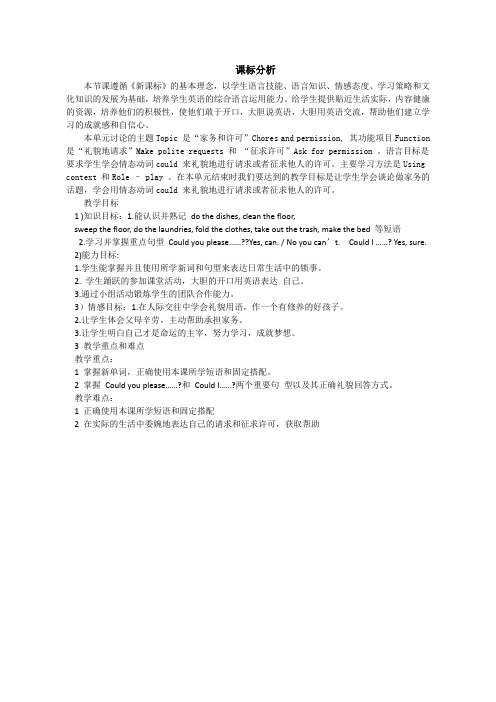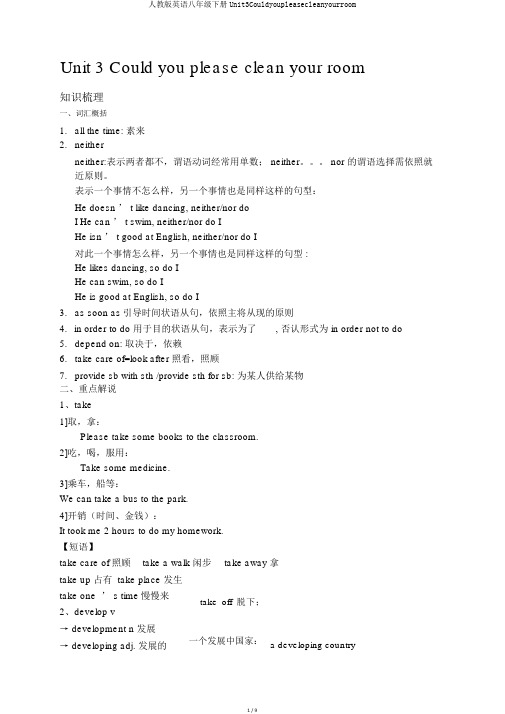【人教版】八年级下册:Unit 3 Could you please clean your room(学生版)
初中英语人教版八年级下册Unit 3 could you please clean

Unit 3 Could you please clean your room?Period 1 (Section A 1a—1c)Ⅰ. Teaching aimsⅰ.Learn the new expressions for different chores, like do the dishes, sweep the floor, take out the rubbish and so on. ⅱ.Learn to make polite requests using “Could you please…?”ⅲ.Encourage students to help their parents do chores.Ⅱ. Important and difficult keysImportant keysⅰ.Learn key words and expressions.ⅱ.Learn to make polite requests using “Could you please…?”Difficult keyHow to answer the question “ Could you please…?”Ⅲ. Teaching proceduresStep ⅰ Lead-in(ⅰ) Greet the students as usual(ⅱ) Ask students the meaning of “family”, it means ,“Father and mother ,I love you.”Next ,show students two questions, “Do you love your parents?”“Do you do chores at home?”Tell them do chores means do housework(做家务).They can answer the questions together.(ⅲ) Then , play a flash for students, ask them what it istalking about.Step ⅱ Presentation(ⅰ) New words and phrases.Show some pictures on the whiteboard, ask students to say what they are doing in Chinese, and then teach them the new phrases. Such as, do the dishes, take out the rubbish and so on, and read after me. At the same time, let them pay attention to some keys.(ⅱ) ChallengeShow the students some phrases in Chinese, ask some students to say out their English expressions, which can check teaching and learning.Step ⅲPractice(ⅰ) Look and sayThis activity aims to review the new phrases.There are some cards on the teacher’s desk. And at the corner of the classroom, there are some cleaning tools, too.First, tell students what to do in this activity and how to do it.Then, invite some students to perform in pairs. A student acts the other finds out the phrase. Next, put up the cards on the blackboard one by one. At the same time, add a new phrase,mop the floor(拖地).Also, ask a student to take out the rubbish, I can give her three sentences,“Take out the rubbish.”“Please take out the rubbish.”“Could you please take out the rubbish?”According to her responses, let students choose a more polite sentence. Finally, introduce the structure “Could you please…?” Tell them when we want to make polite requests, we can use the structure “Could you please…?”and we can make conversations like this ,A: Could you please...?B: Yes, sure. / All right. /No problem. / Certainly.So rry, I can’t. I have to do...Sorry, I can’t. I am doing...Show students conversations, let them know how to response.(ⅱ) Invite some students to answer questions using “Yes./ Sure. / All right. ”“ Sorry, I have to…”and so on. StepⅳListeningActivity 1bRead the instruction. Point to the chart, show students the columns with the heading Peter’s mother and Peter.Tell students that they will hear a conversation between Peter and his mother. They have to listen to the recordingcarefully and check the chores Peter’s mother or Peter does.Play the recording the first time. Students only listen.Then play a flash, ask students to check their answers.Later correct the answers.Step ⅴ Pair workActivity 1cTell students today is their house Clean-up Day. Make conversations between them and their parents using the new phrases and structures.Give them several minutes to do it. Then invite some pairs to act it out for the class.StepⅵConsolidationDo some exercises for consolidation.StepⅶSummaryIn this period, we’ve learned how to make polite requests. Through some listening and speaking practice, we consolidated The target language and we know we should love our parents and help them with housework at home.Step ⅷHomework(ⅰ) Remember the new phrases.(ⅱ) Learn to how to use the new structure.。
初中英语人教版八年级下册Unit 3 Could you please clean

Unit 3 Could you please clean your room?Section A 1a- 2c一、教学目标:1)知识目标:1.重点词汇:chore(s), do the dishes, sweep the floor, take out the trash,make the bed/table, fold one’s clothes, clean the living room/bedroom…2.重点句型:Could you please do the dishes?--- Yes, sure./Sure.Sorry, I can’t. I have to do my homework.2)能力目标: Ss can make requests politely.3)情感目标:Make requests politely and be helpful.二、教学重、难点:How to make polite request.三、教学预设特色与创新:通过本堂课的教学,要让大部分学生学会掌握各种家务活的英语说法,学会用英语礼貌地向别人提出请求及其回答。
因此在教学过程中设计了一些很受学生欢迎的教学环节和活动:视频导入,游戏,pairwork, groupwork,还有各环节之间的自然过渡,通过这些符合学生心理特征及激发学生兴趣的教学活动,达成让学生脱口而出地使用本节课的目标语言的目的。
四、教学准备:Textbook,teaching plan,learning plan,PPT.五、教学过程:教学环节:呈现任务和目标——视频引入——学习新知——二人合作——听录音打勾和填空—小组合作展示——本课小结——德育透布置作业。
StepⅠLeading-in1. T: Good afternoon, boys and girls! Ss: Good afternoon.T: Today I am glad to be your English teacher. My first name is He and my English name is Helen.(Write Helen on the Bb) You can call me Ms. He or Helen. Nice to meet you!Ss: Nice to meet you, Helen!2. T: Do you often do housework at home? what chores can you do ?StepⅡPresentation and drill1. Watch a video and talk about them.Play a video. After finishing watching the video.T: Who is this lady? Ss: She is Helen.T: What is she doing? Ss: She is ….2. Preview—check..T: What chores does Helen do? Ss: She does the dishes…..Check the others in the same way.3. Teach the words and phrases. Ss read them in different ways.4. Play the “Say and act.” Game.T: Let’s play a game, OK? How do we play the game? Two students come to the class, I’ll point a chore, the other students say it out , one student write it on the Bb, the two students act it ou t, let’s see who is faster.5. Enlarge vocabulary.T: You have known these chores, what other chores do you know? Talk with each other in your group. Let’s see which group knows the most?StepⅢPairworkT:I think you always do chores, what chores do you do at home ? How often do you do it ? Please tell your partner. Work in pairs as following:Could you often do these things at home ?which do you like to do best ?Which do you dislike to do best?I often ____________.I like to __________best.I dislike to ____________________best.But I have to ________every day.StepⅣListening practiceT: From your work I know you are good kids because you all do chores at home. How about Peter? Does Peter do chores at home?Ss: Sorry, I don’t know.T: If you want to know it, please listen to the tape.1. Listen and finish . Check the answers.2. Listen again and fill in the blanks. Check the answers.3. Ss read the listening conversation.StepⅤ Group workT:you are Peter,your partner is your father or mother.Make a conversation with your partner, then show your conversation.F/M:Could you please ________?P: Yes, sure.Sorry , I 'm going to _________.Could I__________ ?F/M:Yes,you can,but first you have to ________.Sorry, __________.StepVI SummaryT: Class, today you did a very good job, you are clever, smart, careful, helpful and so on. Could you please tell me what you learned today?Ss: Yes, sure. We learned chores…T: Wonderful! You learned very well, and I think you should try your best to do more chores because “We love parents, we help them do chores!”Show the underlined sentences.StepVII Homework1. 回顾今天所教的做家务的词组和表示请求的句型,并抄写3次。
初中英语人教版八年级下册Unit3 Could you please clean y

Unit3 Could you please clean your room?Section B 1 (2a-2c)教学目标:知识技能目标:掌握并灵活运用本课的重点词汇depend .develop. since .neighbor. ill. Drop. (认读词汇independence fairness)重点短语:take care of. in order to. depend on读懂“做家务活动”话题的议论类文章,练习使用“略读策略”能力目标:能够运用所学的知识对某件事情提出自己的看法。
情感态度目标:学会在生活中照顾自己,培养自己的独立意识,懂得有礼貌的提出请求,能尊重家长的建议。
教学重点:1、重点词汇:depend .develop. since .neighbor. ill. Drop. (认读词汇independence fairness)2、重点短语:take care of. in order to. depend on3、重点句型:Doing chores helps to develop children ’s independence.Doing chores helps children understand the idea of fairnessThe earlier kids learn to be independent, the better it is for their future.Housework is a waste of children’s time.They have enough stress from school.They should spend their time on schoolwork in order to get good grades and getinto a good university.It is the parents’ job to provide a clean and comfortable environment at home fortheir children.教学难点:新单词和短语的掌握及句子的理解。
Unit3重点知识讲解与训练人教版八年级英语下册

Unit3 could you please clean your room?本单元语法用could 提出请求和征求许可1.用could 提出请求:常见的结构是“Could you(please)do sth?”,意为“(请)你做某事,好吗?”,是一种比较客气、有礼貌地提出请求的方式。
如果同意对方的请求,可以用“OK.”或“No problem.”等来回答:如果不同意对方的请求,可以用“Sorry,I can't.”等来回答,并以委婉的方式来解释原因。
—Could you please open the door?请你把门打开,好吗?—Sure.当然可以。
Could you please sweep the floor?请你扫一下地,好吗?---Could you take the dog for a walk?请你遛一下狗,好吗?---Sorry, I can’t. I have too much homework to do.很抱歉,我不能。
我还有很多的家庭作业要做。
2.用could征求许可:常见的结构是“Could I do sth?”,意为“我能/可以做某事吗?”。
它的肯定回答和否定回答都不用could,习惯上肯定回答用may, can等,而否定回答用can't 或mustn't(语气重),有时也可避而不用。
—Could I smoke here?我可以在这里吸烟吗?—No, you can't, Look at the sign “No Smoking”!不,你不能。
看那个“禁止吸烟”的牌子!配套练习1.—Mom, could I surf the Internet after finishing my homework?—_______. You’d better go out for a walk.A. Go ahead(开始做)B. Sorry, you can'tC. Of course you can2.—Mom. Could I finish_______ the football match?—No, you have to do your homework first.A. watchB. to watchC. watchingD. to watching3.—Helen, could you please water the flowers in my garden?—_______ . They are so lovely.A. That's too badB. With pleasureC. You're welcomeD. I'm afraid not课文重点知识讲解1.掌握下列短语do the dishes洗餐具sweep the floor扫地take out the rubbish倒垃圾make the bed整理床铺fold the clothes叠衣服clean the living room打扫卧室用Could you please do sth?请你做某事,好吗?造句练习请你洗餐具,好吗?___________________________________________________________?请你倒一下垃圾,好吗?_________________________________________________________?请你整理一下床铺,好吗?_______________________________________________________?请你洗洗餐具,好吗?___________________________________________________________?请你把衣服叠一下,好吗?______________________________________________________?请你打扫一下卧室,好吗?______________________________________________________?out for dinner出去吃饭我可以出去吃饭吗?(could I……)________________________________________________ go to the movies去看电影今天晚上我可以和戴尔去看电影吗?______________________________________________ stay out late待在外面很晚妈妈不让我带在外面很晚。
英语人教版八年级下册Unit-3-Could-you-please-clean-

Unit 3 Could you please clean your room?Unit 3SectionA1a-2d【学习目标】1.掌握1a-2d的词语2.学习提出礼貌的请求和请求允许;3.学会使用句型Could you please...?和Could I...?;【学习重点】掌握一些家务活动相关的动词短语。
掌握情态动词could的用法和助动词do的用法。
【学习难点】掌握情态动词could的用法和助动词do的用法【学习过程】【一】自主学习明确目标1 试读单词,解决语音问题,联系有关旧单词2 查阅下面的短语动词1) 出去吃饭_______________ 2)在外面待到很晚_______________3)去看电影_______________ 4)搭车_______________5)完成做某事_______________ 6)干净整洁_______________7)洗餐具_______________ 8)倒垃圾_______________9)叠衣服_______________ 10)扫地_______________3.观察以上词组的构成方式:【语言点】1. —Peter, could you please take out the trash?请你把垃极倒掉好吗?—Sure, Mom.可以,妈妈。
—Could you please do the dishes? 请洗盘子好吗?—Sorry, I can’t. I have to do my homework.抱歉,我不能。
我得做作业。
【3】合作探究展示提升1.小组讨论。
What kind of chores Peter and his mom will do?小组讨论怎样回答。
2.小组活动编对话3.听力:先阅读2a题中Peter的父亲拒绝的理由。
然后听2a, 2b。
完成练习并核对答案。
4.小组合作做2c。
5.分角色表演2d, 小组讨论解决疑难问题。
初中英语人教版八年级下册Unit 3 Could you please clean

课标分析本节课遵循《新课标》的基本理念,以学生语言技能、语言知识、情感态度、学习策略和文化知识的发展为基础,培养学生英语的综合语言运用能力。
给学生提供贴近生活实际,内容健康的资源,培养他们的积极性,使他们敢于开口,大胆说英语,大胆用英语交流,帮助他们建立学习的成就感和自信心。
本单元讨论的主题Topic 是“家务和许可”Chores and permission, 其功能项目Function 是“礼貌地请求”Make polite requests 和“征求许可”Ask for permission 。
语言目标是要求学生学会情态动词could 来礼貌地进行请求或者征求他人的许可。
主要学习方法是Using context 和Role – play 。
在本单元结束时我们要达到的教学目标是让学生学会谈论做家务的话题,学会用情态动词could 来礼貌地进行请求或者征求他人的许可。
教学目标1 )知识目标:1.能认识并熟记do the dishes, clean the floor,sweep the floor, do the laundries, fold the clothes, take out the trash, make the bed 等短语2.学习并掌握重点句型Could you please……??Yes, can. / No you can’t. Could I ……? Yes, sure.2)能力目标:1.学生能掌握并且使用所学新词和句型来表达日常生活中的锁事。
2. 学生踊跃的参加课堂活动,大胆的开口用英语表达自己。
3.通过小组活动锻炼学生的团队合作能力。
3)情感目标:1.在人际交往中学会礼貌用语,作一个有修养的好孩子。
2.让学生体会父母辛劳,主动帮助承担家务。
3.让学生明白自己才是命运的主宰,努力学习,成就梦想。
3 教学重点和难点教学重点:1 掌握新单词,正确使用本课所学短语和固定搭配。
人教版英语八年级下册Unit3Couldyoupleasecleanyourroom

Unit 3 Could you please clean your room知识梳理一、词汇概括1.all the time: 素来2.neitherneither:表示两者都不,谓语动词经常用单数; neither。
nor 的谓语选择需依照就近原则。
表示一个事情不怎么样,另一个事情也是同样这样的句型:He doesn ’ t like dancing, neither/nor doI He can ’ t swim, neither/nor do IHe isn ’ t good at English, neither/nor do I对此一个事情怎么样,另一个事情也是同样这样的句型 :He likes dancing, so do IHe can swim, so do IHe is good at English, so do I3.as soon as引导时间状语从句,依照主将从现的原则4. in order to do 用于目的状语从句,表示为了, 否认形式为 in order not to do5.depend on: 取决于,依赖6.take care of=look after 照看,照顾7.provide sb with sth /provide sth for sb: 为某人供给某物二、重点解说1、take1]取,拿:Please take some books to the classroom.2]吃,喝,服用:Take some medicine.3]乘车,船等:We can take a bus to the park.4]开销(时间、金钱):It took me 2 hours to do my homework.【短语】take care of 照顾take a walk 闲步take away 拿take up 占有take place 发生take one ’ s time慢慢来2、develop v→ development n 发展→ developing adj. 发展的take off 脱下;一个发展中国家: a developing country→ developed adj. 发达的一个发达国家:a developed country3、since(连词)既然,由于 /自从1] “既然、由于”,引导原因状语从句。
英语人教版八年级下册Unit3 Could you please clean

1. d 2. a 3. c 4. e 5. b
2. 4b
Fill in the blanks.
3. Make a list of things your group need to do for a camping trip. Then discuss who will do them and complete the chart.
3.学会使用以下句型:
1) Why wasNancy’s mom angry withNancy?
2) You watch TV all the time and never help out around the house.
3) I can’t work all day and do housework all evening.
(4) I’m just as tired as you.
(5) My mom did not say anything and walked away.
(6) Neither of us did any house work for a week.
(7) Could I borrow that book?
1)学习并掌握新词汇:
throw; all the time; neither; shirt; pass; borrow; lend; finger; hate; while
2)能正确使用以下常用表达:
throw down; come over; all the tome; help out; shout back; in surprise; neither of us; as soon as; pass sb. sth.=pass sth. to sb.; borrow sth. from sb.; lend sb. sth.; hate to do sth.
- 1、下载文档前请自行甄别文档内容的完整性,平台不提供额外的编辑、内容补充、找答案等附加服务。
- 2、"仅部分预览"的文档,不可在线预览部分如存在完整性等问题,可反馈申请退款(可完整预览的文档不适用该条件!)。
- 3、如文档侵犯您的权益,请联系客服反馈,我们会尽快为您处理(人工客服工作时间:9:00-18:30)。
Unit 3学生通过本讲学习,能够掌握本单元的重点词汇句型,并在综合能力上有一定的拓展。
1.all the time: 一直2.neitherneither:表示两者都不,谓语动词经常用单数;neither。
nor的谓语选择需遵从就近原则。
表示一个事情不怎么样,另一个事情也是同样如此的句型:He doesn’t like dancing, neither/nor do IHe can’t swim, neither/nor do IHe isn’t good at English, neither/nor do I对此一个事情怎么样,另一个事情也是同样如此的句型:He likes dancing, so do IHe can swim, so do IHe is good at English, so do I3.as soon as引导时间状语从句,遵循主将从现的原则4.borrow/lendborrow 对主语来说表示借进,固定搭配为borrow…fromlend相对主语来说表示借出,固定搭配为lend…to5.in order to do用于目的状语从句,表示为了…, 否定形式为in order not to do6.depend on: 取决于,依靠7.take care of=look after 照看,照顾8.provide sb with sth /provide sth for sb: 为某人提供某物1. I'm not sure whether I can hold a party in the open air, because it the weather.A. stands forB. depends onC. lives onD. agrees with2. The charity provides homeless people food and clothes.A. withB. forC. as3. --- May I borrow these two books, please?--- Yes, you can them for two weeks.A. borrowB. lendC. buyD. keep4. of us wants to go to the park today, because we have to finish so much homework.A. EitherB. BothC. Neither5. — Tom doesn't know how to draw a comic row of pictures.— .A. So do IB. So am IC. Neither do ID. Neither am I基础演练1. --- Unluckily, Jim didn't pass the English test.--- .A. So did KateB. Neither did KateC. So Kate didD. Neither Kate did2. --- Could I some money? I want to buy some food.--- Certainly! Here you are.A. borrowB. lendC. keepD. buy3. --- Can I this book?--- Yes, but you mustn't it to others.A. lend; borrowB. borrow; keepC. borrow; lendD. lend; keep4. — Tom doesn't know how to draw a comic row of pictures.— .A. So do IB. So am IC. Neither do ID. Neither am I5. I will go to bed I finish my homework.A. whileB. even ifC. untilD. as soon as6. She has lived in the city she was seven years old.A. sinceB. ifC. untilD. that7. you have so much free time, why don't you help me a little?A. ThoughB. ForC. SinceD. So8. This company will young people with good jobs.A. fillB. connectC. compareD. provide9. --- Does Peter still feel lonely in the new school?--- Not any more. He has a friendship with all his classmates.A. madeB. becomeC. developedD. taken10. --- Jack, you don't need these things at all, so don't your money on them. --- Sorry, Mum, I won't.A. useB. costC. payD. waste巩固提高1. 他和他的父母一直住在天津。
He lives in Tianjin with his parents .2. 假期一开始,我们一家人总是尽快去某个有趣的地方。
My family always go somewhereinteresting the holiday begins.3. 请把这些面包递给你的弟弟。
Pleas e the bread your brother.4. 她不做任何家务,我也不做。
She did not do any housework and .5. 你能把垃圾倒了吗?Could you please the rubbish?6. 为了英语考试及格,你应该努力学习。
fail in the English exam, you should work hard.7. 每个人都应该依靠自己去创造未来。
We should to create the future.8. 我们经常为山区的孩子提供学习用品。
We often children in village many school things.9. 她是一个新妈妈, 她不知道怎样照顾孩子。
She is a new mother. She doesn'tknow of the baby. 10. 汤姆,不要玩游戏了。
那简直是浪费时间。
Don't play games, Tom. It's time.一、单项选择1. You buy this kind of MP3. It sells .A. should; goodB. could; goodC. must; wellD. could; well2. --- Could I call you by your first name?--- Yes, you .A. willB. couldC. mayD. might3. --- Could I invite my friends to my birthday party?--- Sorry, you .A. canB. can'tC. couldD. couldn't4. Could you me a ruler? Mine is broken.A. lendB. lend toC. borrowD. borrow from5. I'll be upset someone talks to me I'm reading.A. when; whileB. while; whenC. when; whenD. while; while6. The teacher came into the classroom we were writing.A. asB. afterC. beforeD. while7. --- When I was young, I liked playing with toy animals.--- .A. So I wasB. So was IC. So did ID. So I did8. --- Kate didn't leave for Shanghai yesterday evening.--- .A. Mary didn't neitherB. Neither Mary didC. Mary did eitherD. Neither did Mary9. Thanks for your invitation, but I'm so sorry I can't go. I need to my sister at home.A. take awayB. take offC. take care ofD. take out of10. --- Could you come, please? I want some help.--- .A. Sure. I'm coming nowB. You're welcomeC. Yes, I couldD. That's right二、完形填空Nowadays more and more Chinese teenagers find life more difficult without their parents. They don't know how to do 11 . Because their parents do almost everything for them at home. This is a big problem.Joy is 14 years old. One day her parents went away 12 business, so she had to stay at home alone. At first she thought she would be happy 13 her parents were not in. She could do everything 14 she liked. But it was six o'clock in the afternoon, she felt 15 . “Oh, it's time to have supper. Where can I get my food?” she said to herself. Later she found some food in the fridge, but she 16 know how to cook. At that moment, she missed her 17 very much. At last she could only go to the supermarket and 18 some food to eat.Many of teenagers are 19 as Joy. So I think they should learn some basic life skills, like cooking, tidying up their rooms or dressing themselves 20 . They shouldn't depend too mu ch on their parents.11. A. their homework B. some shoppingC. businessD. housework12. A. in B. at C. on D. with13. A. so B. because C. but D. until14. A. that B. who C. where D. when15. A. hungry B. full C. excited D. bored16. A. couldn't B. didn't C. might not D. wouldn't17. A. cousin B. aunt C. brother D. parents18. A. made B. bought C. gave D. saw19. A. the same B. difficult C. different D. warm-hearted20. A. actually B. carelessly C. properly D. slowly__________________________________________________________________________________________________________________________________________________________________一、单项选择1. you wait a few more minutes? It'll be your turn soon.A. MustB. ShouldC. MightD. Could2. I need bananas to make fruit salad. Could you please buy some?A. fewB. a fewC. littleD. a little3. --- Do you know the way to the post office?--- Yes. Follow me and I'll you.A. callB. pickC. showD. invite4. You may easily lose your way in Shanghai you don't have a map or a guide.A. untilB. unlessC. thoughD. if5. Some Chinese singers sing English songs just as as native speakers do.A. goodB. wellC. betterD. worse6. --- Are your father and mother teachers?--- No, . My father is a doctor and my mother is an office worker.A. bothB. eitherC. neitherD. none7. --- Could you please help me choose an MP4 player online?--- . My computer doesn't work.A. I think soB. I hope soC. I'm afraid I can'tD. I don't agree8. --- Can I help you, boy?--- Yes. There is wrong with my bike.A. somethingB. anythingC. everythingD. nothing9. --- How long may I your bike?--- For a week. But you mustn't it to others.A. borrow; lendB. keep; lendC. lend; borrowD. keep; borrow10. Tom rushed into the house his mother was cooking.A. asB. beforeC. whileD. after二、阅读理解AShould we teenagers help our parents do chores? Is it important for us to learn how to do chores? I think so. Most of the teenagers like us students are the only children in each family. So our parents love us very much. They do everything for us and don't want us to do any housework. I think it's bad for us. The following is a real story.I have a classmate named Li Ting. She is the only child in her family. Her parents love her so much that they don't let her do any chores. Every day she only gets up, has meals, goes to school, comes home,does homework and goes to bed. So she doesn't know how to do chores. One day, her father was badly ill and had a n operation in a hospital. Her mother had to take care of her father in the hospital and couldn't cook the dishes for her. Li Ting didn't know how to cook the meals. She often felt hungry. Later she even ate instant noodles only for her meals. From the story we know it's important for us to learn to do chores and other skills from now on.1. Teenagers are the children who are .A. young boysB. young girlsC. middle school studentsD. primary school students2. The writer thinks it's necessary for the teenagers to .A. learn to do choresB. do the dishesC. make the bedsD. fold the clothes3. What does "instant noodles" mean in Chinese?A. 烩面B. 方便面C. 拉面D. 米饭4. Now most of the teenagers .A. like making meals.B. can make noodles for themselves and the familyC. are the only children in each familyD. do most of the chores in the family5. Which of the following is true?A. Li Ting's father was ill in hospital.B. One day Li Ting was ill and needed an operation.C. Li Ting often does housework at home.D. Li Ting's teacher wrote this article.BMicrosoft founder Bill Gates says that 13 is a right age for a child's first cell phone. He said that he didn't allow his children Jennifer and Rory to have phones until their thirteenth birthday and his youngest daughter Phoebe was still waiting for one."In our family, it's 13 where you get a phone, " Mr. Gates said. "Because of the r ule, my children often complained from school. They thought all the other kids had cell phones except them. "Though Bill Gates is very rich, he said he wanted their children to be as common as other kids. It was reported that their children had to do chores and had a little pocket money. And in 2010 Mr. Gates said that he planned to give most of his $61 billion fortune(财富) away rather than hand it down. "That wouldn't be good either for my kids or society, " he said.Since he stepped down from M icrosoft in 2008, he has concentrated(专注) on charity. He said that helping others gave him the same energy as creating software. Mr. Gates was once the richest man in the world, but he became the second in 2010 after he decided to give away $28 billion to charity.6. According to the passage, Mr. Gates has children.A. tworB. threeC. fourD. five7. From the passage we know that Phoebe .A. is less than 13 years oldB. is more than 13 years oldC. usually gets much pocket moneyD. has got a cell phone8. The underlined word "that" here means .A. having a cell phoneB. getting pocket moneyC. giving away the moneyD. handing down the money9. What did Mr. Gates do after he left Microsoft?A. He sold cell phones.B. He stayed at home and did nothing.C. He opened another software company.D. He put his heart into charity and helped others.10. What can we know from the passage?A. Gates doesn't let his child ren own phones.B. Gates doesn't love his children at all.C. Gates is strict with all his children in life.D. Gates' children will inherit(继承) much money.CAn old man lived with his little grandson. Every day the old man got up early to read book s.One day the grandson asked, "Grandpa, I want to read books as you. But I always forget what I read. What are the advantages of reading?"The grandfather didn't answer him, but he said to the boy, "Take this little basket to the river and bring back a basket of water for me." The boy went to the river to fill the basket with water, but all the water leaked out before he got back home. The boy was sad, but his grandfather laughed and said, "You'll have to walk faster next time."The next time the boy ran faster, but the basket was still empty before he returned home. The boy said, "See, grandpa, it's no use!""Is it useless?" the old man said, "Look at the basket."The boy looked at the basket and found that the basket was different. It was much cleaner."That's what happens when you read books. Maybe you can't understand or remember everything. Something will change in your mind after you read. Just like the basket."11. The old ma n every day.A. carried waterB. read booksC. wrote booksD. told his grandson some stories12. After the grandson read books, he .A. threw the booksB. got up lateC. always forgot what he readD. couldn't sleep as well as usual13. The grandson used to get some water from a river.A. a basketB. a bowlC. a glassD. a bottle14. The underlined "leaked out" may mean in the passage.A. 装满B. 漏完C. 沸腾D. 灌溉15. We will after we read books.A. not have any changesB. understand everythingC. change something in our mindD. never forget what we read课程顾问签字: 教学主管签字:。
